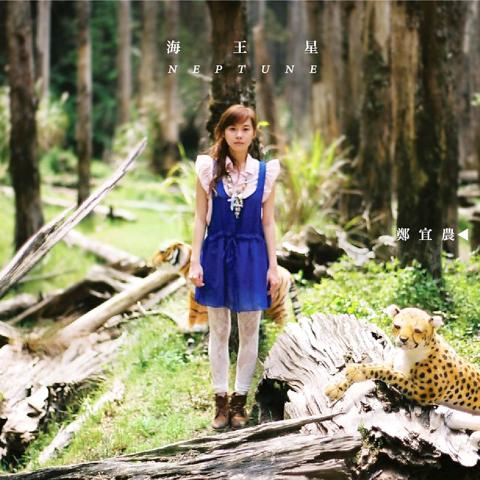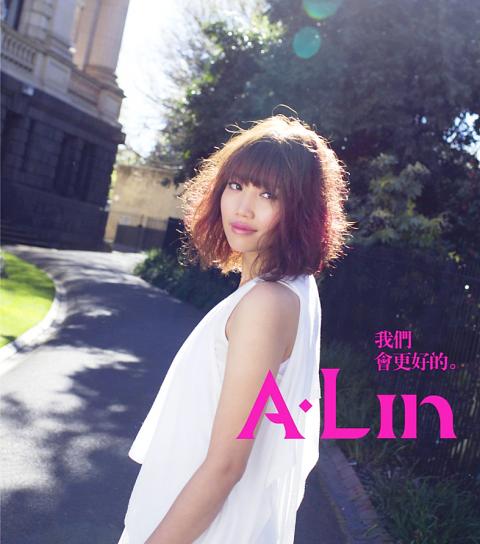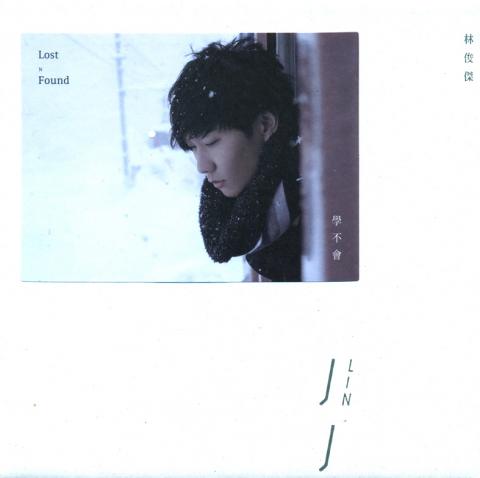Enno Cheng (鄭宜農), Neptune (海王星), White Wabbit Records (小白兔唱片)
In many ways, Enno Cheng (鄭宜農) is the picture-perfect Taiwanese indie star. The 24-year-old first made a splash as a co-screenwriter and lead actress in the 2007 film Summer’s Tail (夏天的尾巴), a coming-of-age teen drama that earned her a Golden Horse Award nomination for best new performer.
At the same time, Cheng garnered favorable attention for her contribution to the film’s soundtrack, which consisted of a handful of catchy acoustic folk-rock numbers. She has a whispery sweet, pitch-perfect voice, and her songs, mostly sung in Mandarin, dwell on youthful love and relationships. Cheng further bolstered her hipster credentials when she joined Broken Social Scene on stage as a guest singer at the Canadian group’s appearances in Taipei in 2008, and again in 2010.

Neptune (海王星), a mix of acoustic ballads and slowcore rock, is Cheng’s first full-length album. She received production assistance from her friends and labelmates at White Wabbit Records, which include the members of post-rock band Aphasia (阿飛西雅), the chamber quartet-cum-post-rock group Cicada and indie rock trio Windmill (風籟坊). Aphasia’s guitarist Wu Yih-chun (吳逸駿) served as the producer, and his contribution and direction greatly benefit this work.
Cheng’s lyrics tend towards a poetic simplicity, best captured by the album opener, Your Sun (太陽): “These big blue skies / bring out all of me to shine for you / and be your sun” (大大的藍色的天/就讓我用全部的自己為你發光/當你的太陽). Cheng gets away with her heart-on-sleeve and somewhat cutesy manner because the song is grounded in a sense of solitary sadness. She picks a gentle and steady accompaniment on a nylon-string guitar, and her voice is marked with a plaintive strain, echoed by the restrained whines of electric guitar feedback, provided by Wu.
That looking-out-the-bedroom-window-on-a-rainy-day feel extends to tracks like The Long Road (路) and Still Afraid (還是會害怕失去你), which are nicely dramatized by the cello, violin and piano instrumentation by Cicada. Cheng is happy-go-lucky on the 1960s-ish pop number Spring Love (春天) and indulges in youthful innocence on Beautiful Song, which gets a little too sappy. The English refrain, “So I wanna sing a beautiful song / just like I love you,” perhaps won’t feel as moving to native speakers as it might to Taiwanese listeners.

The album’s best moments are when Cheng leaves the comfort zone of acoustic pop on tracks like the City of Rain (大雨城市). The song builds tension within a strange, dreamy soundscape, laden with beautifully icy synth tones, and the mood segues into a discomforting realization in the refrain, as Cheng intones “[We] have everything, but actually [we] have nothing” (什麼都有其實什麼都沒有).
Sparks fly on the rousing Independence Day (獨立日), on which Cheng, backed by Windmill, proves she can hold her own in a straightforward modern rock setting. It’s a shame she doesn’t sing more in Hoklo (commonly known as Taiwanese) as she does on the solo acoustic number Sayonara (撒唷那拉), her most unabashedly soulful piece, which ameliorates some of the prissiness that creeps into the album.
As an artist, Cheng impresses not for her pristine, immaculate delivery, but rather for how natural and effortless she is able to make these songs sound.

— DAVID CHEN
A-Lin (黃麗玲), We Will Be Better (我們會更好的), Avex
When a singer who is approaching stardom attempts an overhaul of his or her image, the result is often interesting.
A-Lin (黃麗玲), the two-time Golden Melody Award-nominated Aboriginal songstress mostly known for her melancholic ballads such as Lovelorn, Not Guilty (失戀無罪) and Loneliness Is Not the Hardest Part (寂寞不痛), has jettisoned her lovelorn countenance to embrace more upbeat themes on her fifth studio album, We Will Be Better (我們會更好的).
Despite having made a name for herself as the voice of the brokenhearted, the happily married chanteuse is apparently tired of delivering romantically dejected anthems. On her newest offering, she appears in an angelic white dress on the album cover and delivers empowering messages.
As a concept album, We Will Be Better is divided into three chapters: “Intro” charts her new music style; “Interlude” revisits her trademark piano ballads; and “Outtro” sums up her album’s message.
The lead single, Big, Big Hug (大大的擁抱), composed by Skot Suyama, is a sprightly, mid-tempo ballad that extols the virtues of life and love. The soulful songstress expands her repertoire with the rock numbers How Are You Afterwards? (後來,你好嗎?) and Behave (乖).
The title track is A-Lin’s newest call, in the vein of Lovelorn, Not Guilty, to be strong after heartbreak.
A-Lin delivers not one but two songs celebrating wisdom born of age. 1828, the lyrics of which were written by herself, is an autobiographical ballad that describes “the flower that keeps waiting at 18 and comes to fruition at 28.” Meanwhile, the anthemic Every Me (每一個我) sees A-Lin bidding farewell to her youth by singing “good-bye to every me that was once confused and stubborn.”
In less talented hands, this album could have become a trite compilation. But A-Lin’s emotionally charged delivery and firm grasp of romantic travails ground these songs in a perceptive and intelligent outlook on life.
In this musical manifesto, A-Lin becomes that rare pop performer who celebrates her happy marriage and eulogizes optimism.
— Andrew C.C. Huang
JJ Lin (林俊傑), Lost ’n’ Found (學不會), Warner
It took a decade for Singaporean singer/songwriter JJ Lin (林俊傑) to move into Mando-pop’s “four minor heavenly kings” (四小天王) league. With a boy-next-door face and a waifish body, Lin has never been the traditional pop idol; he’s a songwriter foremost.
While his album of covers, last year’s She Says (她說), demonstrated his brilliance as a singer, Lin bolsters his star charisma with Lost ’n’ Found (學不會), his eighth original album.
The title track is a potent song that ruminates on innocence lost.
Jay Chou’s (周杰倫) long-term lyricist Vincent Fang (方文山) paired up with Lin for the beautifully crafted Romantic Mystery (故事細膩), a ballad that’s poised for chart success.
The highlights are, however, the latter tracks, which showcase Lin’s diverse musical influences and tastes. Clash of the Souls (靈魂的共鳴) boasts Chinese classical star Lang Lang (郎朗) performing Rachmaninoff as the intro, and then it spins off into a pop musing about kindred spirits, while Cinderella is a jazz-inspired pop gem that flaunts Lin’s suave improvisational skills.
Lin makes a nod to electronica in We Together and flirts with hip-hop in Dear Friend (陌生老朋友).
While Lin’s ability to blend genres pays off beautifully, he’s not so adept at dance music and hip-hop.
You won’t find many future KTV classics here. But this musically rich and adventurous album will no doubt push Lin’s star further skyward.
— Andrew C.C. Huang

In the March 9 edition of the Taipei Times a piece by Ninon Godefroy ran with the headine “The quiet, gentle rhythm of Taiwan.” It started with the line “Taiwan is a small, humble place. There is no Eiffel Tower, no pyramids — no singular attraction that draws the world’s attention.” I laughed out loud at that. This was out of no disrespect for the author or the piece, which made some interesting analogies and good points about how both Din Tai Fung’s and Taiwan Semiconductor Manufacturing Co’s (TSMC, 台積電) meticulous attention to detail and quality are not quite up to

April 21 to April 27 Hsieh Er’s (謝娥) political fortunes were rising fast after she got out of jail and joined the Chinese Nationalist Party (KMT) in December 1945. Not only did she hold key positions in various committees, she was elected the only woman on the Taipei City Council and headed to Nanjing in 1946 as the sole Taiwanese female representative to the National Constituent Assembly. With the support of first lady Soong May-ling (宋美齡), she started the Taipei Women’s Association and Taiwan Provincial Women’s Association, where she

Chinese Nationalist Party (KMT) Chairman Eric Chu (朱立倫) hatched a bold plan to charge forward and seize the initiative when he held a protest in front of the Taipei City Prosecutors’ Office. Though risky, because illegal, its success would help tackle at least six problems facing both himself and the KMT. What he did not see coming was Taipei Mayor Chiang Wan-an (將萬安) tripping him up out of the gate. In spite of Chu being the most consequential and successful KMT chairman since the early 2010s — arguably saving the party from financial ruin and restoring its electoral viability —

It is one of the more remarkable facts of Taiwan history that it was never occupied or claimed by any of the numerous kingdoms of southern China — Han or otherwise — that lay just across the water from it. None of their brilliant ministers ever discovered that Taiwan was a “core interest” of the state whose annexation was “inevitable.” As Paul Kua notes in an excellent monograph laying out how the Portuguese gave Taiwan the name “Formosa,” the first Europeans to express an interest in occupying Taiwan were the Spanish. Tonio Andrade in his seminal work, How Taiwan Became Chinese,